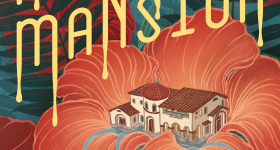The author's mother Daisy (center, seated) with her family in Mandaue, Philippines as a child.
In my teens, back when my hair was too long and my CD player almost always accompanied me to the dinner table, I didn't enjoy talking to my parents. Our conversations, which centered on school, grades and the ever-ominous future, were often followed by scoldings, remonstrations and groundings. My headphones rarely left my ears.
But after I left for college, talking became easier. My mother remained an inveterate scrutinizer of misdeeds, but because she lacked the jurisdiction to send me to my room or lock me out of the house, I cheerfully ignored her advice (later learning, as heedless sons do, that she was right about most everything).
As I grew older and settled into adulthood, I started calling my mom at least once a week. I’d ask for recipes, or advice on appliances -- she knew everything about rice cookers -- or for news from home, which I visited less frequently. Sometimes I just needed someone to talk to. Our ritual involved me airing out the various injustices of my day, followed by her ignoring most of my comments and counseling me instead on matters completely unrelated. I’d complain about life’s banality, and she’d ask me if I’d started a 401K yet. We had a fine system.
Three months after my mother’s death, I still want to pick up the phone, but I know she won't answer.
---
My mother's death from cancer in November left us bereft of not only her company, love and interminable advice, but without another, more basic element: her language. My mom was Filipino, from the island of Cebu, and she spoke Cebuano, a language native to the region. She spoke English, too, but she communicated with me only in her own tongue. This was our strange dynamic: I talked to her in English and she responded in Cebuano. It confused the hell out of people.
I liked that oddity, even as I grew ashamed that I'd lost my side of the language. Sometimes when I was in college my mom would call on Skype. She'd talk rapid fire over the computer speaker: ‘Are you studying, are you eating well, have you considered majoring in business?’ My roommates would listen in, unable to understand, and I'd go, ‘Yeah ma, okay. I'm fine.’ Then I'd say something about leaving school to join a punk band and she'd get mad. My friends, hearing her tenor shift to a low screech, would chuckle. A mother’s tone, if not her words, is universal.
Sometime in elementary school I lost the ability to speak Cebuano, from peer pressure or self-preservation or laziness, I don't know. It must have been a subtle, unconscious declaration: I am American, I speak English. Her language remained part of me through our conversations—I knew all the words, I just didn't know how to say them back. Now, I don't even have the opportunity to listen.
If language has cultural significance, it's significant what our culture says about language. There was a recent uproar over a Coca- Cola Super Bowl commercial that featured a multi-lingual performance of the song “America the Beautiful.” The mean-spirited and shortsighted Twitterverse denounced the ad under the hashtag #FuckCoke. Tweeted one twit: "Fuck you coke for trying to diversify my country tis of thee [sic] fucking speak English and be normal #fuckcoke."
This sentiment—and the assertion that it's somehow abnormal or un-American to speak, let alone sing, in another language -- is absurd. Albert Einstein was born in Germany. Former Secretary of State Madeleine Albright in the Czech Republic. The laborers who built the railroads in China. And so on. We are a country of foreigners, of distant tongues and rich backgrounds. I'm ashamed for the Americans who don't, or refuse, to see that.
Perhaps the silver lining to this collective display of national ignorance was the resounding response from the other side of Twitter: "If you're complaining about … the multi-lingual Coke commercial, you can buy a one way ticket back to the 60's," one person wrote.
Alas, dear tweeter, racism, unlike conversations with my mother, has not been relegated to the past.
But history is crucial in this conversation on language. What I've lost is, essentially, a link to my history. And it’s a history worth remembering, because for all its foreignness, it contains an essentially American story. My grandparents were school teachers, but my grandfather was fired from his job after getting into a fist fight with his principal. (That’s not the American part, though it’s a little bit John Wayne.) He parlayed unemployment into entrepreneurship, building the first corn and rice mill in the then-rural city of Mandaue. That business supported my mother and her seven brothers and sisters, who were able to go on to various successes. My Uncle Mart became a leading neurologist in the Philippines, my Aunt Almira became a nurse in Chicago, my mom Daisy earned a master's degree in agriculture at the University of Missouri. And now here I am, the product of an American dream.
I know this from interviewing various family members after my mom died; she never spoke much of it herself. But while I've cobbled together a shell of history, the stuff that binds it together is fading. I will never be able to go to Cebu in any role other than as a foreigner. My bonds are limited to blood and curbed by language. It is the fate of the first-generation American. We trade our parents’ homes, their histories and languages for a new life in a new world.
One day, I may have kids with an American woman, and those American children will know nothing of Cebuano. And they, speaking only English from birth, may wonder aloud on Twitter one day: ‘Why would anyone want to sing “America the Beautiful” in any other language?’ Of course, I'd try not to raise children so stupid.
I can't help but feel that the language of my American story has become sadder, less interesting, more two-dimensional now that my mother is gone. I wonder if I'll completely forget Cebuano, or if I'll be able to maintain a working knowledge through relatives and trips to the Philippines, where my mom is buried. I wonder what she’d say if I called her today and asked why she never forced me to speak Cebuano at home.
I imagine she’d say she wanted me to succeed in America. After all, we speak English here.
Yeah, I’d say, but I wish I knew more.
And then she’d ask, ‘Have you done your taxes yet?’
---
Arvin Temkar is a full-time journalist and part-time essayist. He’s hung out with cowboys in Brooklyn, eaten trash in the name of journalism, swam with sharks and interviewed the presidents of two countries. He speaks one language okay, two others poorly, and still wants to be in a punk band. Follow @atemkar.









Comments